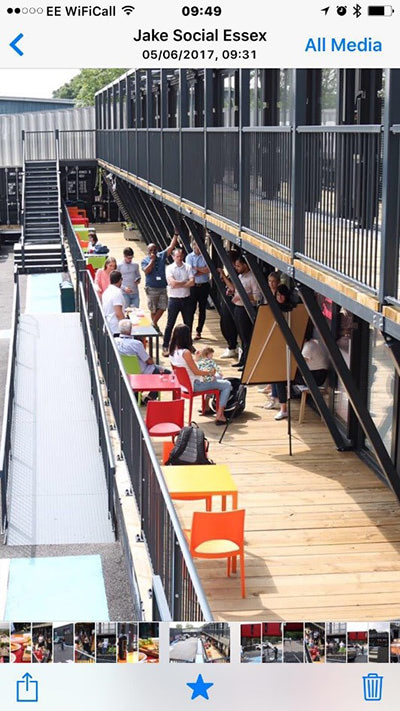Entrepreneurial learning and the CRATE experience: a new business model for Colleges?

Epping Forest College is located in West Essex, but only 20 minutes from the centre of London. 90% of our local business are tiny – less than 10 employees.
Most are start-ups, so it is an entrepreneurial economy. As Head of Enterprise and Innovation at the College, I have tried to attract local entrepreneurs to courses offered by the College in a wide range of formats – but without a great deal of success.
My role brought me into contact with a local enterprise hub, less than a mile from the College, called CRATE.

CRATE houses 42 units on a single site, in converted ship containers. Most of the 42 units are for small start-up businesses, using the CRATE site as their first base, or transferring from a small home office.
The hub is on two floors, with generally retail, creatives and production businesses on the ground floor, and service businesses on the first floor.
A key principle is that there can only be one business of its type on the site – so there is no competition between businesses.
The site is managed by a site ‘curator’, who generally manages the site and, as importantly, looks to the development needs of the entrepreneurs.
It is this role that sparked my interest, and subsequently, my closer involvement.
I could see on my visits that CRATE offered significant support to the entrepreneurs on its site, to such an extent that it had the feel of a local learning community, and I have outlined below some of the ways in which this happens.
In CRATE, almost all learning and development is anchored by a problem to solve, “the need”.
Typically, the businesses will have tried to solve this themselves and fallen short.
Solutions to the problem, “the development”, will often be new areas of skills or knowledge not previously encountered, meaning they treat the leaning as more legitimate and, simply, necessary.
So learning is driven by business need. Time is also precious to the entrepreneurs, meaning they have a necessity/urgency to filter out what learning is key and what is secondary or superfluous.
For example, a CRATE business looking to export required help in locating a cost-effective supply.
An existing exporter at CRATE helped the business understand the requirements and then referred the entrepreneur to a supportive service provider that specialised in provision to SMEs.
The confidence and capacity to tackle business challenges when times get tough is a real challenge for the isolated ‘solo-prenuer’, working on their own out of their spare bedroom, garage, shed or isolated office.
Having other entrepreneurs at hand ensures support is embedded and natural when needed…without necessarily having to ask.
The businesses look upon each other as ‘someone like me’, so when encouragement is offered they know it is coming from someone who’s been there.
It many cases this may simply be reassurance, but it is enough to build confidence and create forward momentum.
As CRATE mixes in a few seasoned entrepreneurs, their experience helps avoid the many pitfalls of business growth.
For example, one CRATE business wanted to trial its offering in a footfall pop-up in central London to increase exposure. Another CRATE business had experience of this and co-shared a pop-up for a week.
Entrepreneurs and businesses at CRATE develop in real time, when the need is typically most pressing and the context clear.
The physical structure of CRATE has been set up to encourage and embed interaction – for example, there is continuous decking running outside the containers, with tables and chairs to encourage social engagement.

Peer support is in the moment, meaning they can immediately apply learning and receive feedback over the coming days and weeks. Progress becomes a point of discussion, and what started as a discussion between two people spreads, as group dialogue happens naturally.
The CRATE curator facilitates development by helping ‘join the dots’ between CRATE businesses and with external support providers.
Where businesses are from different sectors it won’t always be obvious that parallels (and potential development support) exists.
This is where the curator comes in and firstly enables a connection to be made, and then they have a more active role to play in ensuring both/all parties see the relevance.
The volume of repeat daily encounters between businesses means advice is effectively ‘repackaged’ as a conversation, which is frequent, ‘in the moment’ and practical.
Bite-sized, manageable and more frequent feedback loops enable the development to be more effectively implemented, applied and embedded.
It’s clear from the off that the CRATE businesses know they’re in a community where the give and take of support to one another are central behaviours and values.
The CRATE curator also informally monitors this to ensure it is not being abused and that reciprocal opportunities are regularly there.
Developing generic skills such as analysis, research, critical thinking and communication, also improve achievement. And the beauty is the businesses simply see this as getting on with doing a good job.
Skills development is very much two-way. Firstly, businesses come with needs to one-another. Secondly, when a business is providing support this helps improve listening and communication skills, which are transferable to winning and serving customers.
For example, the CRATE businesses put on and support events at CRATE, such as street markets or launch parties.
This develops skills such as planning, sales and communications. It also helps the businesses think about which customers their products or services are serving, so that they target the right customers and prospects.
There is no doubt in my mind that CRATE is an effective learning community, and one that combines business and learning to a powerful effect.
If entrepreneurs find it difficult to get away from the day job, then learning ‘on the job’ in this well supported and communal environment, where everyone has a benefit in sharing and listening, is a ‘business learning’ model for the future, and one that offers a challenge to the FE sector.
Why come to college when you can ‘grow your own’?
Two ways in which our College can contribute to this off-site learning community is through additional support and on-site presence.
We already have a strong connection to CRATE through my involvement, providing support to both the curators and the businesses themselves, on an ‘on-demand’ basis, which may in future lead to a retainer-based service.
And another strong possibility is for the College to take rental for one of the units itself – to be an on-site presence.
Together these would provide CRATE businesses with:
- immediate access to College expertise as a drop in centre (experts present perhaps on a rotational basis – Monday accountancy, Tuesday legal, etc)
- additional student support via work experience for up to 42 businesses who, if growing rapidly, might appreciate quick and locally available workforce support
- providing on-site learning sessions, or even full courses, which are usually College based, but with sufficient interest from enough CRATE businesses, could be run entirely on the CRATE site
- use of College service facilities not available on site, such as design, photography, large volume printing, etc
It would of course provide benefits to the College too:
- possible additional revenue
- introducing CRATE businesses to specific College courses they might otherwise not have been aware of
- opportunities for work experience and also apprenticeships
- extended networks to other businesses linked to the CRATE community
In essence, there are prospects for a longer term, SLA-based partnership with CRATE, which will be of significant benefit to both CRATE and the College.
This may well be a more sustainable and appropriate business model for the College, particular with regard to micro, entrepreneurial businesses.
Watch this space…
Arnie Skelton, Head of Enterprise and Innovation, Epping Forest College (EFC)
Thanks to John and Adam Walker, Founders, Owners and Curators of CRATE, for their help in preparing this article.











Responses